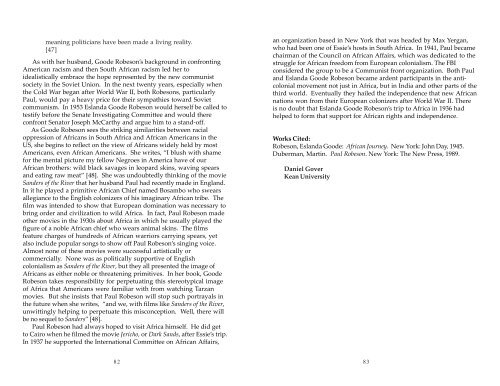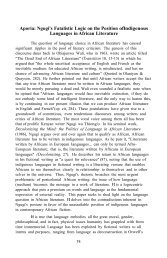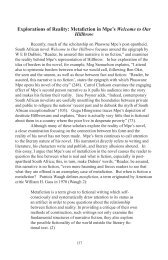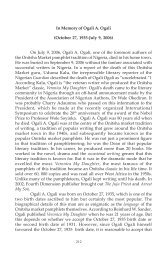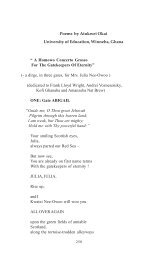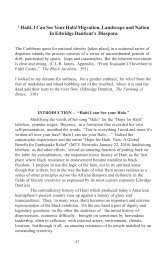Eslanda Goode Robeson's African Journey
Eslanda Goode Robeson's African Journey
Eslanda Goode Robeson's African Journey
You also want an ePaper? Increase the reach of your titles
YUMPU automatically turns print PDFs into web optimized ePapers that Google loves.
meaning politicians have been made a living reality.<br />
[47]<br />
As with her husband, <strong>Goode</strong> Robeson’s background in confronting<br />
American racism and then South <strong>African</strong> racism led her to<br />
idealistically embrace the hope represented by the new communist<br />
society in the Soviet Union. In the next twenty years, especially when<br />
the Cold War began after World War II, both Robesons, particularly<br />
Paul, would pay a heavy price for their sympathies toward Soviet<br />
communism. In 1953 <strong>Eslanda</strong> <strong>Goode</strong> Robeson would herself be called to<br />
testify before the Senate Investigating Committee and would there<br />
confront Senator Joseph McCarthy and argue him to a stand-off.<br />
As <strong>Goode</strong> Robeson sees the striking similarities between racial<br />
oppression of <strong>African</strong>s in South Africa and <strong>African</strong> Americans in the<br />
US, she begins to reflect on the view of <strong>African</strong>s widely held by most<br />
Americans, even <strong>African</strong> Americans. She writes, “I blush with shame<br />
for the mental picture my fellow Negroes in America have of our<br />
<strong>African</strong> brothers: wild black savages in leopard skins, waving spears<br />
and eating raw meat” [48]. She was undoubtedly thinking of the movie<br />
Sanders of the River that her husband Paul had recently made in England.<br />
In it he played a primitive <strong>African</strong> Chief named Bosambo who swears<br />
allegiance to the English colonizers of his imaginary <strong>African</strong> tribe. The<br />
film was intended to show that European domination was necessary to<br />
bring order and civilization to wild Africa. In fact, Paul Robeson made<br />
other movies in the 1930s about Africa in which he usually played the<br />
figure of a noble <strong>African</strong> chief who wears animal skins. The films<br />
feature charges of hundreds of <strong>African</strong> warriors carrying spears, yet<br />
also include popular songs to show off Paul Robeson’s singing voice.<br />
Almost none of these movies were successful artistically or<br />
commercially. None was as politically supportive of English<br />
colonialism as Sanders of the River, but they all presented the image of<br />
<strong>African</strong>s as either noble or threatening primitives. In her book, <strong>Goode</strong><br />
Robeson takes responsibility for perpetuating this stereotypical image<br />
of Africa that Americans were familiar with from watching Tarzan<br />
movies. But she insists that Paul Robeson will stop such portrayals in<br />
the future when she writes, “and we, with films like Sanders of the River,<br />
unwittingly helping to perpetuate this misconception. Well, there will<br />
be no sequel to Sanders” [48].<br />
Paul Robeson had always hoped to visit Africa himself. He did get<br />
to Cairo when he filmed the movie Jericho, or Dark Sands, after Essie’s trip.<br />
In 1937 he supported the International Committee on <strong>African</strong> Affairs,<br />
82<br />
an organization based in New York that was headed by Max Yergan,<br />
who had been one of Essie’s hosts in South Africa. In 1941, Paul became<br />
chairman of the Council on <strong>African</strong> Affairs, which was dedicated to the<br />
struggle for <strong>African</strong> freedom from European colonialism. The FBI<br />
considered the group to be a Communist front organization. Both Paul<br />
and <strong>Eslanda</strong> <strong>Goode</strong> Robeson became ardent participants in the anticolonial<br />
movement not just in Africa, but in India and other parts of the<br />
third world. Eventually they hailed the independence that new <strong>African</strong><br />
nations won from their European colonizers after World War II. There<br />
is no doubt that <strong>Eslanda</strong> <strong>Goode</strong> Robeson’s trip to Africa in 1936 had<br />
helped to form that support for <strong>African</strong> rights and independence.<br />
Works Cited:<br />
Robeson, <strong>Eslanda</strong> <strong>Goode</strong>: <strong>African</strong> <strong>Journey</strong>. New York: John Day, 1945.<br />
Duberman, Martin. Paul Robeson. New York: The New Press, 1989.<br />
Daniel Gover<br />
Kean University<br />
83


